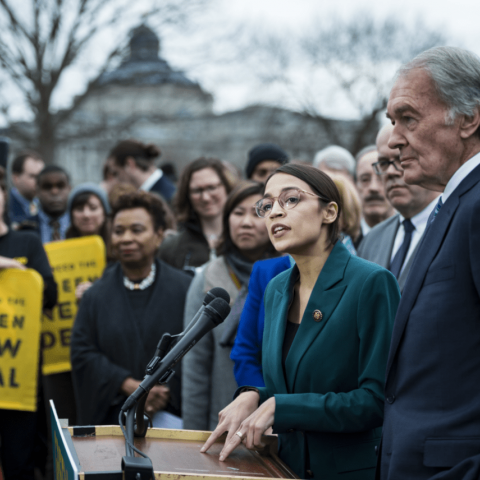
On February 7, 2019, Representative Alexandria Ocasio-Cortez and Senator Ed Markey proposed the Green New Deal, a set of programs that advocate for modernized infrastructure, green energy sources, new transportation practices and the elimination of greenhouse gas emissions by 2030. Cornell Professor Robert Howarth, ecology and environmental biology, highlights specific Cornell campus sustainability programs that have helped set the stage for the Green New Deal and weighs in on the feasibility of the proposal as a whole.
While a radical move to many, the Green New Deal comes in the wake of growing evidence that climate change is an anthropogenic issue. An official report stating that human activities have resulted in a temperature increase of approximately 1.0°C above the pre-industrial levels, has spurred the international community to action.
The report expressed concern that a warming of 1.5°C above pre-industrial levels would result in consequences significantly more severe than the current circumstances. It also offered the more striking evidence that 2013 to 2018 has been the warmest 5 years in recorded history, with temperatures in 2018 topping the charts.
While the Green New Deal is in line with mounting evidence of anthropogenic climate change, the feasibility of eliminating greenhouse gas emissions by 2030 is debatable and the process to do so is expensive, experts say.
“Is it expensive? Yes. Is it necessary? Yes,” said Professor Robert Howarth, ecology and environmental biology. “[It] should’ve been done 10 years ago, [and] the longer we wait the worse it gets.”
According to Howarth, as the effects of global warming grow, so will the effects on the economy.
“The human health cost of fossil fuel pollution in this state alone we estimated at $17 billion a year,” Howarth said. “Fossil fuels cause a huge amount of damage to crop productivity and to human health. In the Jacobson et al. plan we wrote for the state of New York we estimated 4,000 people in the state die prematurely every year due to the direct effects of air pollution from burning fossil fuels.”
Howarth emphasized that with our nation potentially shifting toward a more sustainable future, Cornell’s role as a leader in the field of sustainability is now more important than ever.
Among institutions of higher education, Cornell has been a leader in sustainability since 2009, when it established its Climate Action Plan, a proposal that aims to achieve carbon neutrality on campus by 2035. The CAP and Green New Deal have parallel goals in achieving sustainability while combating economic and environmental inequality.
“I think Cornell’s pledge to go carbon neutral by 2035 is part of momentum which has helped lead the state to this CCPA and has set the stage for the Green New Deal,” Howarth said.
Cornell is attempting to serve these goals through various campus projects, including the development of lake source cooling and earth source heat.
Lake Source Cooling (LSC) is a project that utilizes cold lake water from Cayuga Lake to cool the campus. The project hopes to create an 86 percent reduction in energy needs.
Additionally, Cornell is investigating a similar endeavor for campus heating through the Earth Source Heat project. The project involves digging deep wells to harness geothermal energy to supply heat to the Ithaca campus. If earth source heat is successful, Cornell can lead by example and encourage other institutions to adopt similar renewable strategies.
Similarly, Cornell has done research into smart grids, which collect energy usage information to better publicize the importance of energy efficiency. This is a technology that is directly mentioned in Ocasio-Cortez’s proposal.
Most notably, Cornell has been successful in minimizing transportation emissions through more sustainable commuting options like public transportation and carpooling. Cornell has also improved the efficiency of its campus vehicles, increasing the number of electric cars in its fleet.
While the nation and the University progresses toward carbon neutrality, questions remain as to the viability of reaching these goals by the stated deadlines.
“The university is going to have to accelerate their efforts. I don’t think we are on target to reach [the goals] at the moment,” Howarth said.
Howarth acknowledges the potential for Cornell to reach its commitment; however, he said that it is contingent on campus engagement. If Cornell is to reach this goal, it will require more students to actively take part in Cornell’s initiatives.
According to Howarth, a campus climate that clearly values the sustainability practices of the university would encourage the student body to work towards achieving beneficial climate initiatives.
“2035 is ambitious, but if you don’t set ambitious goals then you don’t do anything because the goals are too far off in the future,” Howarth said.
